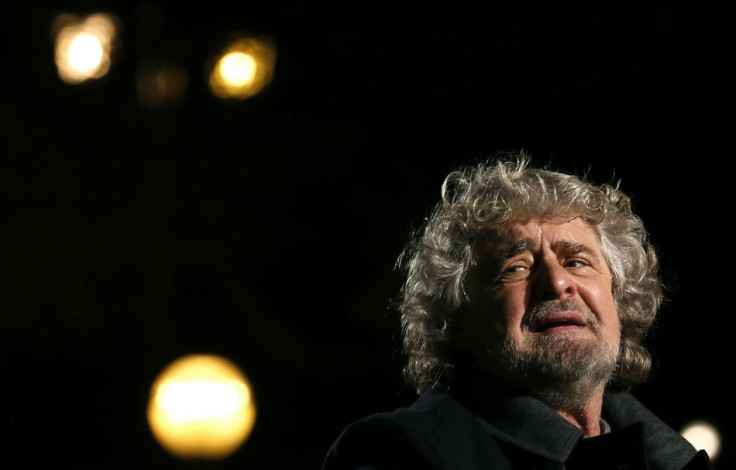Ukip demands Five Star Movement heads as Italian party backtracks on alliance defection
M5S to campaign for referendum on Italian eurozone membership as part of conditions to work with Ukip.
The Italy's anti-establishment party Five Star Movement (M5S) has rejoined Ukip in the European parliamentary group they co-founded in 2014 after a failed attempt to seek new allegiances – but the renewed cooperation comes at a price.
The M5S will no longer share the presidency of the Europe Freedom and Direct Democracy (EFDD) group with Ukip, leaving Nigel Farage as the sole president. Farage, who was in Brussels on 10 January, said that all differences with the M5S had been resolved "in an amicable manner", but some "administrative changes" needed to be made.
Gaining full control of the presidency was one of the changes, as former co-president David Borrelli was a lead proponent of splitting from Ukip to join the Alliance of Liberal and Democrats for Europe (ALDE).
M5S's leader Beppe Grillo confirmed on his blog that Borrelli was no longer in that position. A spokesperson from Borrelli's Brussels office told IBTimes UK that it was "shared decision" to have "only one president" in the group, adding that the situation remained "fluid".
Another person to close his position is Borrelli's advisor and former M5S chief of staff Francesco Calazzo, who won't see his contract renewed once it expires in February, a source told IBTimes UK.
In a further demonstration of the M5S delegation's loss of influence, the EFDD group said it withdrew support for the candidacy of M5S Fabio Massimo Castaldo for the position of deputy president of the European Parliament. On Twitter, Castaldo wrote that he took the decision out of his own free will during a group meeting.
.@FMCastaldo will no longer be the EFDD candidate for Vice-President of the European Parliament.
— EFDD Group (@EFDgroup) January 10, 2017
The M5S is also expected to continue their efforts to hold a referendum in Italy over eurozone membership. Farage wrote in a statement on 10 January: "The Grillo campaign for a referendum on Italy's membership of the eurozone is gaining momentum. I have long admired his work in Italy and wish him well. The anti-establishment campaign in Europe is really just starting."
Back with Brexit-focused Ukip and with less influence within the group, the party's prospects for success in influencing Europe appear slimmer than ever, and some of the 17-strong M5S delegation question their own political future. One of the MEPs, Marco Affronte, announced on 11 January that he was leaving the EFDD to join the Greens - European Free Alliance group as an independent.

Grillo's gamble
Over the weekend, Grillo had called for a members' consultation on the M5S position in the European Parliament, and recommended joining ALDE. He said that remaining in the group while Ukip was planning for Brexit would mean "spending the next two years without a common political objective". According to one of the M5S lawmakers, the vote on the move was scheduled without the MEPs being consulted.
The consultation resulted in a strong preference for Grillo's recommendation. But within the strongly pro-EU ALDE group there was vocal opposition to the deal with M5S, which is seen as populist and eurosceptic.
M5S' priorities include a reform of monetary and immigration policies, objection to trade deals and promotion of friendly relations with Russia. This contrasts with ALDE which is a proponent of stronger European integration and the so-called European army.
ALDE leader and candidate for the presidency of the European Parliament, Guy Verhofstadt, had remained quiet on the issue until he admitted on 9 January that "There is insufficient common ground to proceed with the request of the Five Star Movement to join the ALDE group. There remain fundamental differences on key European issues."
On 10 January, Grillo lashed out at Verhofstadt, who is one of the EU's chief Brexit negotiators, for "bending to the will of the establishment". Grillo had previously blamed "the establishment" for preventing the party's entry in what would have become the parliament's third largest group following the alliance.
In the same statement, Grillo said that remaining in the EFDD was the second-most popular option in the online consultation, failing to mention that less than 16% of those who voted, opted for it.
© Copyright IBTimes 2025. All rights reserved.






















